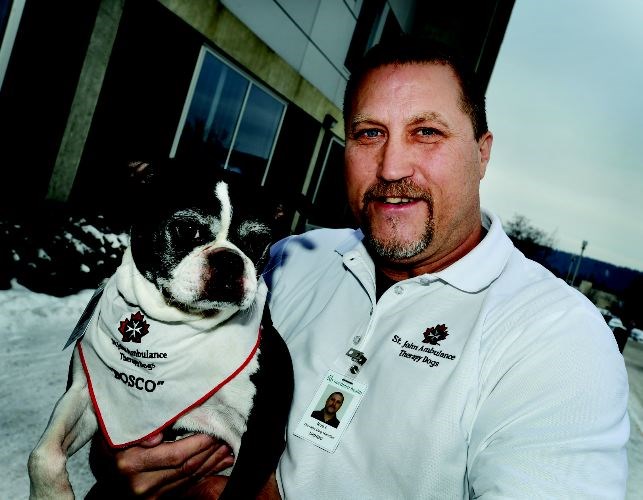It doesn't matter if there's a retired firefighter captain in the room, the light always shines most brightly on the real star, Bosco, the Boston terrier.
Owner Rob Ingham, who retired in September from Prince George Fire Rescue after more than 30 years of service, wasn't sure he'd have enough to do after the busy days of being a firefighter and three years ago decided to enlist his little canine friend for assessment and therapy dog training offered by the local branch of St. John Ambulance.
As the pair quickly walk through the lobby at the University Hospital of Northern B.C. staff, visitors and patients alike show delight when they see Bosco trotting along sporting his therapy dog scarf that's jauntily placed around his neck.
"People light up when they see Bosco coming and it's like I'm not even there and that's OK and it's interesting, we spend just as much time with the staff as we do with the patients," said Ingham, who spent 30 years providing instruction at the local St. John Ambulance, which was one way he gave back to the community.
Ingham really likes the organization and wanted to stick with it and found the St. John Ambulance therapy dog program, coordinated by Judi Dowson, would suit him and Bosco, 7, very well. After training, the program, which started locally in 2008, takes the dog and owner into hospitals, seniors care facilities, community centres and libraries and even during exam week where there are stressed-out students at schools, universities and colleges.
There are more than 20 teams in the local St. John Ambulance therapy dog program.
Six months ago, Ingham started volunteering for Victim Services, provided by the RCMP to victims of crime or those suffering from trauma.
Volunteers, who work in teams of two, offer support that includes sitting with a victim while waiting for emergency services, calling family and friends or providing information so they can find out about how the court system works and offer referrals to agencies that can help them.
"Any time there's a victim, whether it's an assault, domestic violence, theft or whatever it happens to be, the RCMP members offer the Victim Services number and that's how it starts," said Ingham.
Flip through The Citizen's Volunteer City series, featuring stand-out volunteers in Prince George:
Victim Services volunteers can be called to the scene or if it's something like a person who witnessed someone get hit by a car and they can't cope, there are opportunities to provide referrals so that person can get the help they need, he explained.
"It's very rewarding," said Ingham, who went through a lot of training to become a volunteer. As a firefighter and member of the critical response team for the last 20 years or so and lead for the last 10, Ingham has had a lot of experience dealing with people in the midst of tragedy.
Those skills that have been honed over decades can be redirected to help victims in all stages of need.
"What's fulfilled me is helping people in this capacity where I worked at getting the knowledge I need and I have the empathy for people in these situations," said Ingham, who took his emergency medical training out of country a few years back.
Along with a local skilled medical team, including his emergency room clinical practice leader wife, Lynn, Ingham went to a refugee camp in Sierra Leone for two weeks in 2009 and 2010 and a small village in Peru in 2011 and 2012. The two-week long Willamette medical missions, organized by Dr. Steven Chang, took four doctors, four nurses and other volunteers who each financed their own trip.
"I did a lot of bandaging and other little things when I went on these missions," said Ingham. "People were very sick in Sierra Leone. Just myself I did 55 HIV tests and 53 tested positive. We did a lot of medical treatment but we also did a lot of education because we're going to leave and these people were left there."
The missions really changed Ingham's perception of the world and offered some very clear perspective.
"I remember complaining about the price of gas as we headed to the airport," said Ingham. "Then we get there and nobody has clothes and if they have shoes they don't match and there's no clean water."
Ingham said he walked away with only the clothes on his back because he gave everything he had away just like everybody else did on the medical mission.
Ingham said he'll increase his hours as he becomes more comfortable in the role of Victim Services and therapy dog volunteer because he'd like to stay busy in his retirement.
"Sitting with someone and just being there after a crisis is so important," said Ingham about the role of a Victim Services volunteer. "And silences? Sometimes it's just what a person needs."

.png;w=120;h=80;mode=crop)

